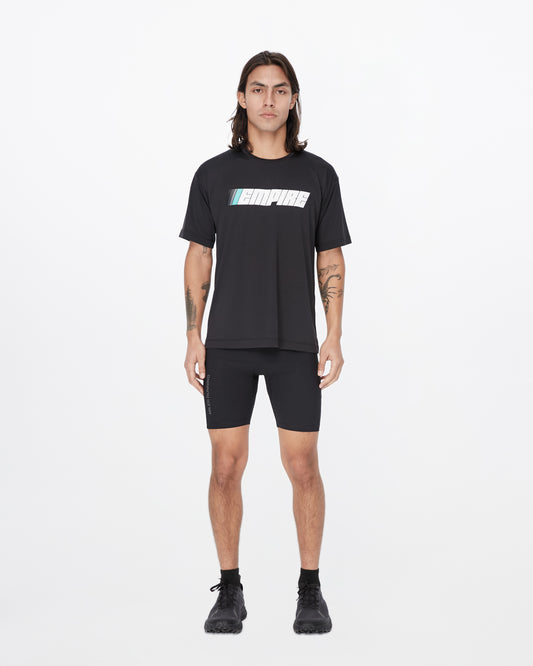Empire Elite: Journal

ENTRY 3: CHASING SPLITS
JULY 9, 2024
WORDS BY BEN MORROW AND INMA ZANOGUERA
A quick running metaphor: It is often assumed the best path to running a PR is maintaining a steady pace. However, if you break any race into smaller segments, one finds that even splits are an unachievable ideal. The lesson: success in running, competition and life never truly transpires at a constant pace. A professional track athlete is given a chance to make the Olympics once every four years—one bad split and four years’ worth of work can feel irreversibly ruined. But in the uneven path to success, a positive result is still achievable after one bad split. The Empire Elite Track Club competed over the last few weeks in three different national meets with high hopes to make the Olympics, and although they came up short, their momentum is sure to carry them to a strong finish.
The journey for Eric Holt, Ben Allen and Jack Salisbury began three weeks ago in Eugene, Oregon, home of the University of Oregon and the historic track at Hayward Field. Eugene is a small college town—the closest airport of size is in Portland, Oregon, where most athletes arrive by plane (some, like Empire Elite, fly from the other side of the country) before driving two hours to their final destination. But the reward is Hayward Field, the best track and field facility in the nation, and Eugene, a town brimming with energy and unabashed love for the sport of track and field. While Oregon is often plagued by rainfall much of the year, the last two weeks of June saw only 70-degree weather and clear skies for the entire ten days of festivities.
The race schedule at the trials, particularly in the sprint and mid distances, is purposefully built to challenge athletes’ endurance over a span of several days. Multiple elimination rounds, often on the same or successive days, take place before advancing to the decisive final round. Most professional track athletes do not race on back-to-back days during the regular season, so the trials are a careful exercise in preserving energy: running just-hard-enough-but-not-too-hard until the final. On the plus side, because this format is a close approximation to that of the actual Olympics, the U.S. often fields a team that is well prepared to perform on the global stage.
The competition kicked off on Day 1 with Jack, Ben and Eric in the first rounds of the 1500m. Eric would advance to the semi-finals taking place the following day. In the semi-finals, the top five and next two fastest move on. Eric found himself in the pack for his semi-final but was forced to make several taxing moves during the race, leaving him without the strength to attack. He finished the race in 11th place and did not make the final. But he performed impressively, and his efforts did not go unnoticed; two days later, Eric signed a multi-year professional contract with Puma, a dream and goal years in the making for one of the founding athletes on the team.
Eric and Ben returned a few days later during the second block of racing for another chance to make the team in the 800m. Eric breezed to the semi-final with an automatic qualifier finishing in the top six. Ben finished his first-round heat in seventh place but secured a nonautomatic qualifier based on his time of 1:47.29, among the next three fastest after the automatic qualifiers. As the stakes got higher (there are only two automatic qualifiers for first and second place in the 800m semi-finals), the races heated up. Ben held his ground in the top five until the last 100m, when he faded from the pack on tired legs. Most of his competitors had not doubled in the 1500m earlier that week, as Ben had. In the next heat, Eric crossed the finish line in a disappointing fourth, but turning to the scoreboard, a little “q” appeared next to his name and he embraced the third place finisher to celebrate their mutual accomplishment—both would race the finals based on their times. Unfortunately, this joy was short lived as, soon after the race, officials issued Eric a disqualification for stepping on his inside line during the first 100m of the race. While not the desired outcome, Eric proved once again that he deserved his new sponsorship and can make the finals of any race.
Outside the U.S., the team wasn’t finished with two more national championships on the calendar. Haz Miawad had been quietly travelling the globe—flying from Nashville to Toronto to Cameroon to Egypt—to race and improve his World Ranking. Unfortunately, he couldn’t outrun this intense travel schedule and came down with a serious virus before the African National Championships and did not make the finals. Haz recovered enough to win the Egyptian National Championship a few days later, but without making the finals in Cameroon, his World Ranking would not improve from 53 to the top 48 required to qualify for the Olympics. Across the ocean, team member Zalen Nelson became the 800m champion for Trinidad and Tobago with a commanding win at his national championship. Although, as a relatively new professional athlete and without a high enough World Ranking, he won’t attend the Olympics.
The path to the podium is long, uneven, and often unpredictable. It has only just begun for the Empire Elite Track Club. Every split, good or bad, fast or slow, is a step forward.
Regular reports on the team will be posted on this page and Instagram. You can also follow the club Instagram and team member Ben Allen’s behind-the-scenes YouTube channel. The full race calendar for the team is located on the Empire Elite page.

ENTRY 2: FLAGSTAFF TRAINING CAMP
JUNE 4, 2024
WORDS BY INMA ZANOGUERA AND BEN MORROW
Coffee cups in hand, four Empire Elite athletes chat relaxedly on Zoom from their living room in Flagstaff, Arizona. The scene is mundane but telling: a moment of morning calm before a full day of work, which often includes a morning track workout and late afternoon run, on top of strength work, stretching routines, massages and cooking. Downtime is spent napping, watching the NBA playoffs or, like Hazem, studying, but there is little energy left for more.
For five weeks, Hazem Miawad, Ben Allen, Eric Holt and Jack Salisbury have left behind their regular lives in New York City to focus on training ahead of the upcoming U.S. Olympic Trials in June and, if all goes according to plan, the Paris 2024 Summer Olympics in August. Not only does Flagstaff offer world class running facilities, but sitting at an optimal 7,000 feet above sea level, the mountainous city is perfect for altitude training permitting runners to sleep and live at high elevation and workout at lower elevation within an hour’s drive. The reduced oxygen in this environment will make any runner feel unfit, but after a training camp in Flagstaff last winter that yielded positive results for the indoor season, the team fully trusts the process and this trip felt just like “another business trip” in the words of Ben Allen.
Though track performance can be measured mathematically, success in the sport is more complex. Athletes can qualify for the Olympics in two ways. Half the places are filled by achieving an entry standard time and the other half are given entry according to the points-based World Rankings. Generally, three qualifying athletes per nation are given spots and, for this reason, national meets like the U.S. Olympic Trials are held to determine the top qualifying athletes from a country.
Several factors make navigating this system far from straightforward, especially for unsponsored athletes like those of Empire Elite. To run a qualifying time, weather conditions must be favorable and the field of racers needs to be fast to push the pace. To collect World Rankings points, athletes must finish high in the field at specified qualifying meets. Entry to these meets is never guaranteed—committees often determine who gets to compete and athletes without big-brand sponsorship or an agent advocating for them are at a disadvantage. Not to mention there are the added difficulties of financial cost, strain from travel and scheduling complexities. For example, despite finishing first in the 1500m at the gold-level NYC Grand Prix in 2023, Eric Holt was not guaranteed entry to this year’s competition. Thankfully, a few weeks before this year’s race, Eric was given a spot.
Back in Flagstaff the intricacies of qualifying were brushed aside to focus on one thing: training. A lot of sacrifices had been made for this opportunity, including leaving family, friends, and jobs back home. Hazem and Ben, who both coach track at the Masters School in Dobbs Ferry, came to Arizona a month before the high school’s track season ended and were keeping tabs on their athletes via text. Sacrifices were also made when it came to nutrition. The endless food choices in New York would never be found in Flagstaff, where Eric’s homemade pasta easily surpassed any dish from the Italian restaurants in town. Yet, this led to a favorite routine not always logistically feasible in New York where the four athletes gather to cook together each night.
After the conclusion of training camp in Flagstaff, the team immediately flew to Nashville for the bronze-level Music City Track Carnival. Eric, Hazem and Ben swept the podium with first, second and third place finishes in the 800m, respectively, as well as taking home three PBs and OTQ times. The work in Flagstaff had undoubtedly paid off.
Regular reports on the team will be posted on this page and Instagram up through the U.S. Olympic Trials. You can also follow the club Instagram and team member Ben Allen’s behind-the-scenes YouTube channel. Watch one of the team’s recent "insane" track workouts in Flagstaff on the Sweat Elite YouTube channel.
The team will compete next at the USATF NYC Grand Prix at Carl Icahn Stadium in New York City this Sunday (6/9).

ENTRY 1: OLYMPIC YEAR
FEBRUARY 28, 2024
WORDS BY INMA ZANOGUERA AND BEN MORROW
PHOTO BY JOHNNY ZHANG
The Paris 2024 Summer Olympics will take place this summer, but the Empire Elite Track Club has been fixated on this moment since its founding. In 2021, Empire Elite emerged from the unwinding of the NJNY Track Club and quickly proved they would carry the mantle as New York City’s professional track team at the US Olympic Trials. Dressed in black, the team punched above its weight with strong finishes in the Men’s 1500m (8th, Colby Alexander), Women’s 1500m (8th, Dani Argon) and Men’s 3000m Steeplechase (5th, Isaak Updike). Three years later, the team roster has grown with hopes to represent the US, Egypt, and Trinidad and Tobago in the upcoming Olympics.
Empire Elite is New York City’s professional track team. From the Millrose Games to the Brooklyn Mile, the New York City running community knows the team in black. Often leading the pack is team member Eric Holt, who has relentlessly attacked races and excited spectators since the team's founding when he began a streak of breakout finishes. The momentum has not slowed since for Eric or the team. This indoor season, the club has notched nearly a dozen PBs, two world standards and the third fastest all-time US indoor 1000m, creating the platform and momentum for the important outdoor season ahead.
The last opportunity to watch Empire Elite this indoor season will be the Trial of Miles meet taking place this Saturday (3/2) at the Armory in New York City's Washington Heights neighborhood. The full race calendar for the team is located on the Empire Elite page.
Regular reports on the team will be posted on this page and Instagram up through the US Olympic Trials. You can also follow the club Instagram and team member Ben Allen’s behind-the-scenes YouTube channel.
Support the Team
-
Empire Elite Work Running SS Tee
Regular price $110.00 USDRegular priceUnit price per -
Empire Elite Work Running Hat
Regular price $65.00 USDRegular priceUnit price per




